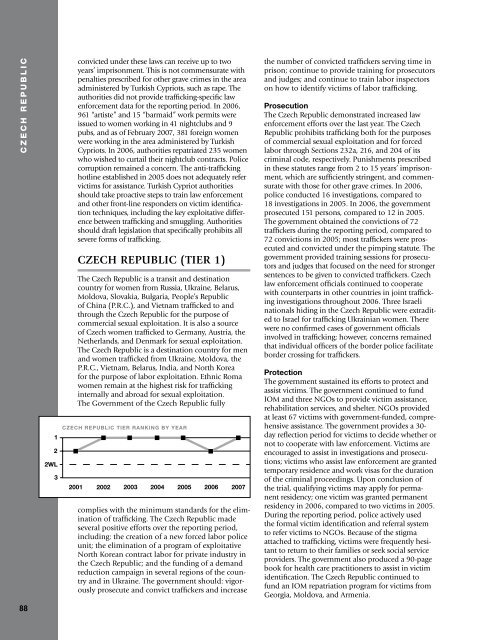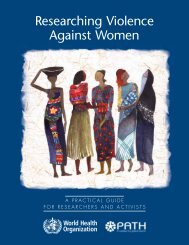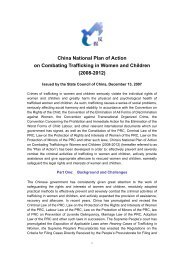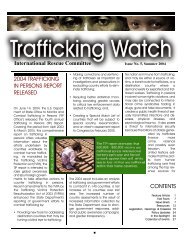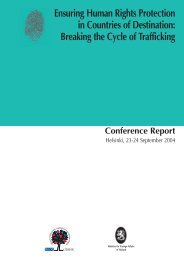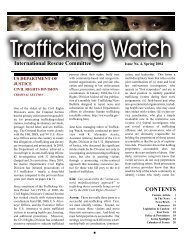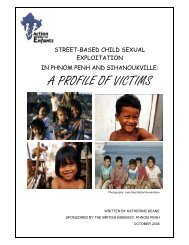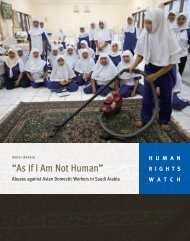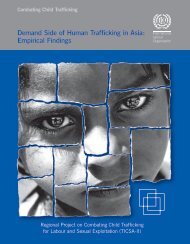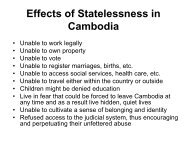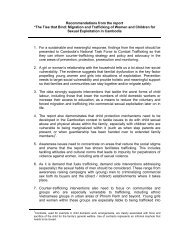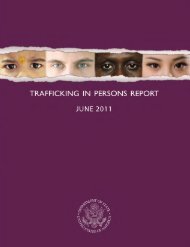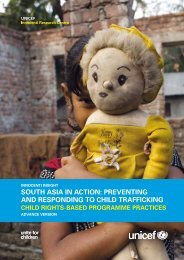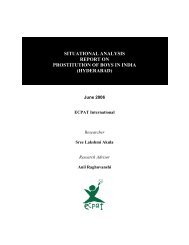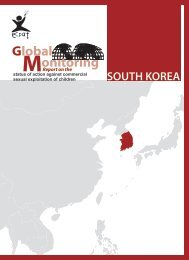2007 Trafficking in Persons Report - Center for Women Policy Studies
2007 Trafficking in Persons Report - Center for Women Policy Studies
2007 Trafficking in Persons Report - Center for Women Policy Studies
Create successful ePaper yourself
Turn your PDF publications into a flip-book with our unique Google optimized e-Paper software.
C Z E C H R E P U B L I C<br />
88<br />
convicted under these laws can receive up to two<br />
years’ imprisonment. This is not commensurate with<br />
penalties prescribed <strong>for</strong> other grave crimes <strong>in</strong> the area<br />
adm<strong>in</strong>istered by Turkish Cypriots, such as rape. The<br />
authorities did not provide traffick<strong>in</strong>g-specific law<br />
en<strong>for</strong>cement data <strong>for</strong> the report<strong>in</strong>g period. In 2006,<br />
961 “artiste” and 15 “barmaid” work permits were<br />
issued to women work<strong>in</strong>g <strong>in</strong> 41 nightclubs and 9<br />
pubs, and as of February <strong>2007</strong>, 381 <strong>for</strong>eign women<br />
were work<strong>in</strong>g <strong>in</strong> the area adm<strong>in</strong>istered by Turkish<br />
Cypriots. In 2006, authorities repatriated 235 women<br />
who wished to curtail their nightclub contracts. Police<br />
corruption rema<strong>in</strong>ed a concern. The anti-traffick<strong>in</strong>g<br />
hotl<strong>in</strong>e established <strong>in</strong> 2005 does not adequately refer<br />
victims <strong>for</strong> assistance. Turkish Cypriot authorities<br />
should take proactive steps to tra<strong>in</strong> law en<strong>for</strong>cement<br />
and other front-l<strong>in</strong>e responders on victim identification<br />
techniques, <strong>in</strong>clud<strong>in</strong>g the key exploitative difference<br />
between traffick<strong>in</strong>g and smuggl<strong>in</strong>g. Authorities<br />
should draft legislation that specifically prohibits all<br />
severe <strong>for</strong>ms of traffick<strong>in</strong>g.<br />
CZECH REPUBLIC (TIER 1)<br />
The Czech Republic is a transit and dest<strong>in</strong>ation<br />
country <strong>for</strong> women from Russia, Ukra<strong>in</strong>e, Belarus,<br />
Moldova, Slovakia, Bulgaria, People’s Republic<br />
of Ch<strong>in</strong>a (P.R.C.), and Vietnam trafficked to and<br />
through the Czech Republic <strong>for</strong> the purpose of<br />
commercial sexual exploitation. It is also a source<br />
of Czech women trafficked to Germany, Austria, the<br />
Netherlands, and Denmark <strong>for</strong> sexual exploitation.<br />
The Czech Republic is a dest<strong>in</strong>ation country <strong>for</strong> men<br />
and women trafficked from Ukra<strong>in</strong>e, Moldova, the<br />
P.R.C., Vietnam, Belarus, India, and North Korea<br />
<strong>for</strong> the purpose of labor exploitation. Ethnic Roma<br />
women rema<strong>in</strong> at the highest risk <strong>for</strong> traffick<strong>in</strong>g<br />
<strong>in</strong>ternally and abroad <strong>for</strong> sexual exploitation.<br />
The Government of the Czech Republic fully<br />
complies with the m<strong>in</strong>imum standards <strong>for</strong> the elim<strong>in</strong>ation<br />
of traffick<strong>in</strong>g. The Czech Republic made<br />
several positive ef<strong>for</strong>ts over the report<strong>in</strong>g period,<br />
<strong>in</strong>clud<strong>in</strong>g: the creation of a new <strong>for</strong>ced labor police<br />
unit; the elim<strong>in</strong>ation of a program of exploitative<br />
North Korean contract labor <strong>for</strong> private <strong>in</strong>dustry <strong>in</strong><br />
the Czech Republic; and the fund<strong>in</strong>g of a demand<br />
reduction campaign <strong>in</strong> several regions of the country<br />
and <strong>in</strong> Ukra<strong>in</strong>e. The government should: vigorously<br />
prosecute and convict traffickers and <strong>in</strong>crease<br />
the number of convicted traffickers serv<strong>in</strong>g time <strong>in</strong><br />
prison; cont<strong>in</strong>ue to provide tra<strong>in</strong><strong>in</strong>g <strong>for</strong> prosecutors<br />
and judges; and cont<strong>in</strong>ue to tra<strong>in</strong> labor <strong>in</strong>spectors<br />
on how to identify victims of labor traffick<strong>in</strong>g.<br />
Prosecution<br />
The Czech Republic demonstrated <strong>in</strong>creased law<br />
en<strong>for</strong>cement ef<strong>for</strong>ts over the last year. The Czech<br />
Republic prohibits traffick<strong>in</strong>g both <strong>for</strong> the purposes<br />
of commercial sexual exploitation and <strong>for</strong> <strong>for</strong>ced<br />
labor through Sections 232a, 216, and 204 of its<br />
crim<strong>in</strong>al code, respectively. Punishments prescribed<br />
<strong>in</strong> these statutes range from 2 to 15 years’ imprisonment,<br />
which are sufficiently str<strong>in</strong>gent, and commensurate<br />
with those <strong>for</strong> other grave crimes. In 2006,<br />
police conducted 16 <strong>in</strong>vestigations, compared to<br />
18 <strong>in</strong>vestigations <strong>in</strong> 2005. In 2006, the government<br />
prosecuted 151 persons, compared to 12 <strong>in</strong> 2005.<br />
The government obta<strong>in</strong>ed the convictions of 72<br />
traffickers dur<strong>in</strong>g the report<strong>in</strong>g period, compared to<br />
72 convictions <strong>in</strong> 2005; most traffickers were prosecuted<br />
and convicted under the pimp<strong>in</strong>g statute. The<br />
government provided tra<strong>in</strong><strong>in</strong>g sessions <strong>for</strong> prosecutors<br />
and judges that focused on the need <strong>for</strong> stronger<br />
sentences to be given to convicted traffickers. Czech<br />
law en<strong>for</strong>cement officials cont<strong>in</strong>ued to cooperate<br />
with counterparts <strong>in</strong> other countries <strong>in</strong> jo<strong>in</strong>t traffick<strong>in</strong>g<br />
<strong>in</strong>vestigations throughout 2006. Three Israeli<br />
nationals hid<strong>in</strong>g <strong>in</strong> the Czech Republic were extradited<br />
to Israel <strong>for</strong> traffick<strong>in</strong>g Ukra<strong>in</strong>ian women. There<br />
were no confirmed cases of government officials<br />
<strong>in</strong>volved <strong>in</strong> traffick<strong>in</strong>g; however, concerns rema<strong>in</strong>ed<br />
that <strong>in</strong>dividual officers of the border police facilitate<br />
border cross<strong>in</strong>g <strong>for</strong> traffickers.<br />
Protection<br />
The government susta<strong>in</strong>ed its ef<strong>for</strong>ts to protect and<br />
assist victims. The government cont<strong>in</strong>ued to fund<br />
IOM and three NGOs to provide victim assistance,<br />
rehabilitation services, and shelter. NGOs provided<br />
at least 67 victims with government-funded, comprehensive<br />
assistance. The government provides a 30-<br />
day reflection period <strong>for</strong> victims to decide whether or<br />
not to cooperate with law en<strong>for</strong>cement. Victims are<br />
encouraged to assist <strong>in</strong> <strong>in</strong>vestigations and prosecutions;<br />
victims who assist law en<strong>for</strong>cement are granted<br />
temporary residence and work visas <strong>for</strong> the duration<br />
of the crim<strong>in</strong>al proceed<strong>in</strong>gs. Upon conclusion of<br />
the trial, qualify<strong>in</strong>g victims may apply <strong>for</strong> permanent<br />
residency; one victim was granted permanent<br />
residency <strong>in</strong> 2006, compared to two victims <strong>in</strong> 2005.<br />
Dur<strong>in</strong>g the report<strong>in</strong>g period, police actively used<br />
the <strong>for</strong>mal victim identification and referral system<br />
to refer victims to NGOs. Because of the stigma<br />
attached to traffick<strong>in</strong>g, victims were frequently hesitant<br />
to return to their families or seek social service<br />
providers. The government also produced a 90-page<br />
book <strong>for</strong> health care practitioners to assist <strong>in</strong> victim<br />
identification. The Czech Republic cont<strong>in</strong>ued to<br />
fund an IOM repatriation program <strong>for</strong> victims from<br />
Georgia, Moldova, and Armenia.


